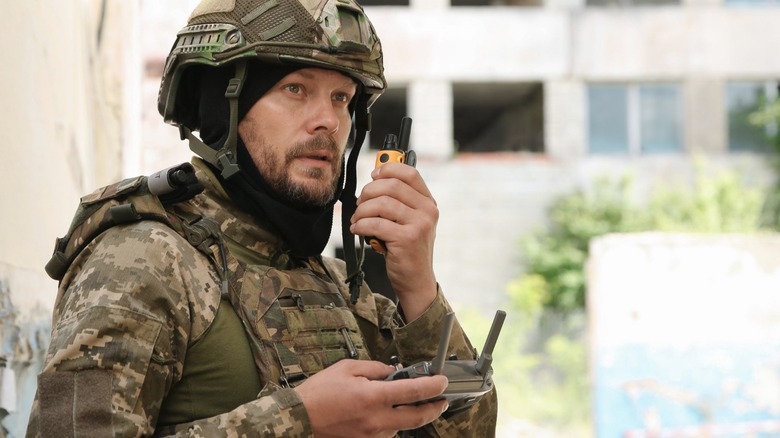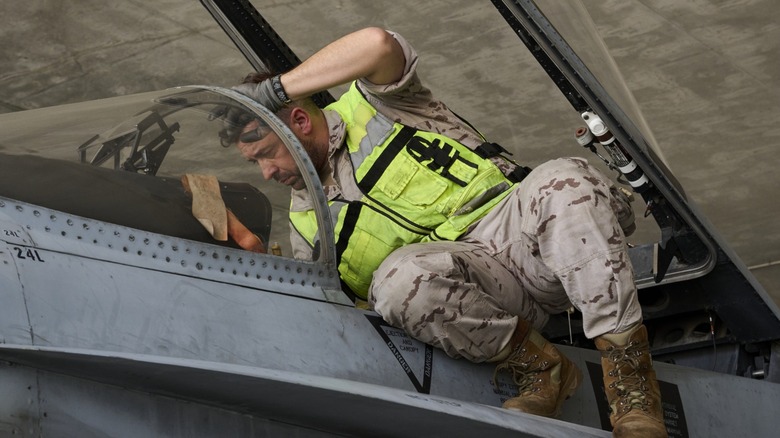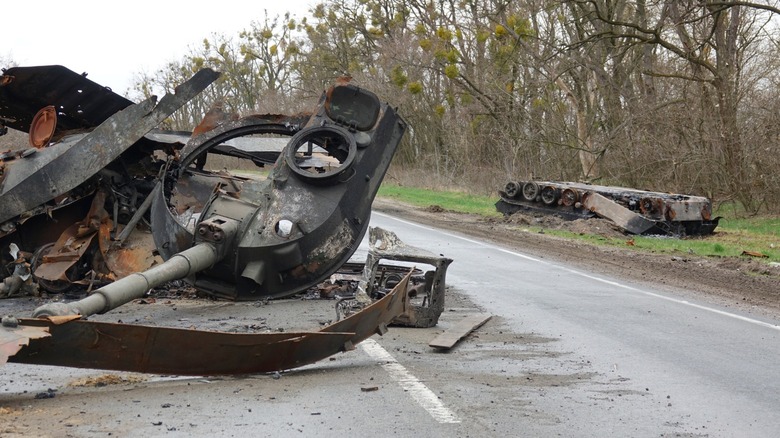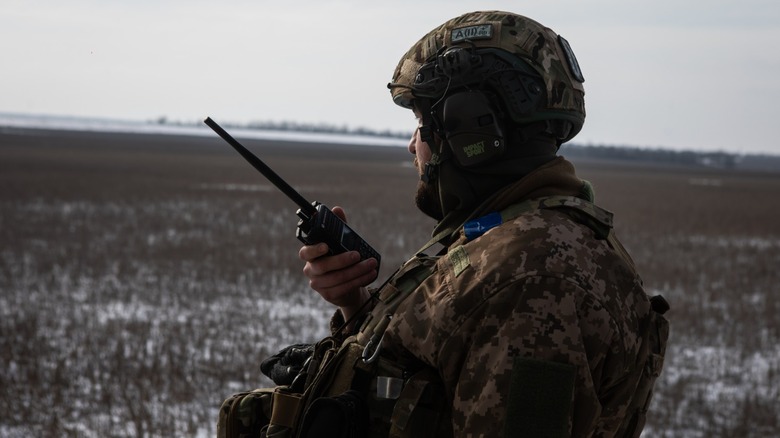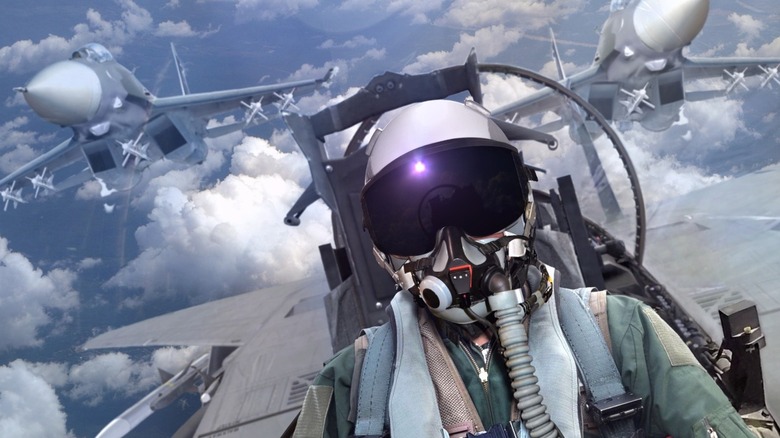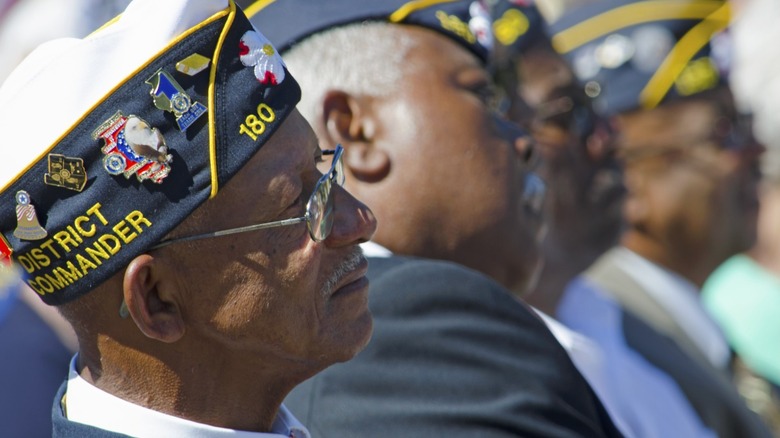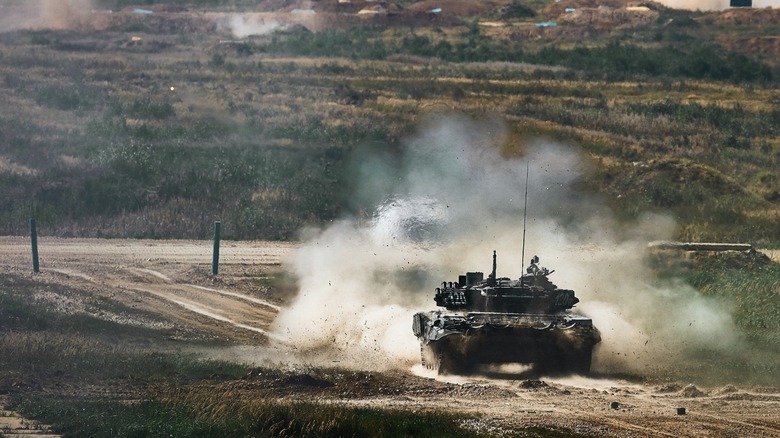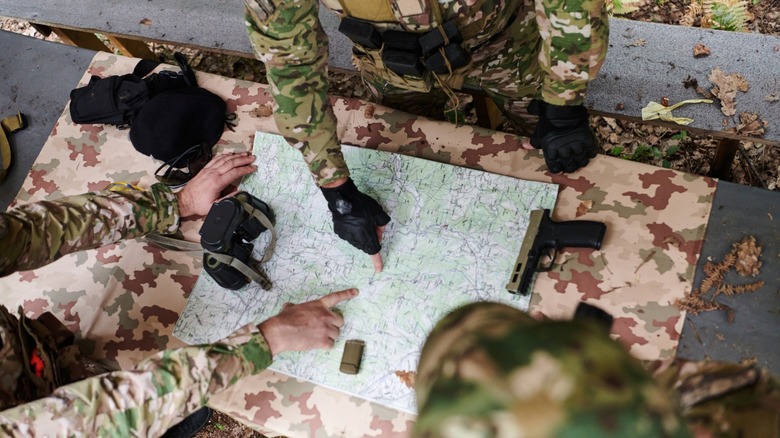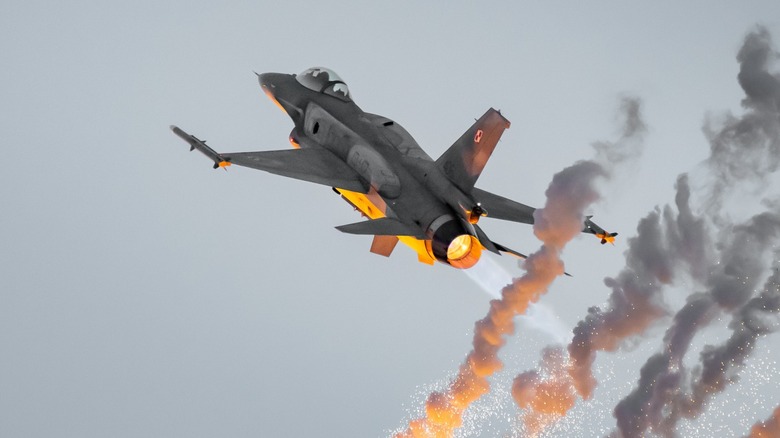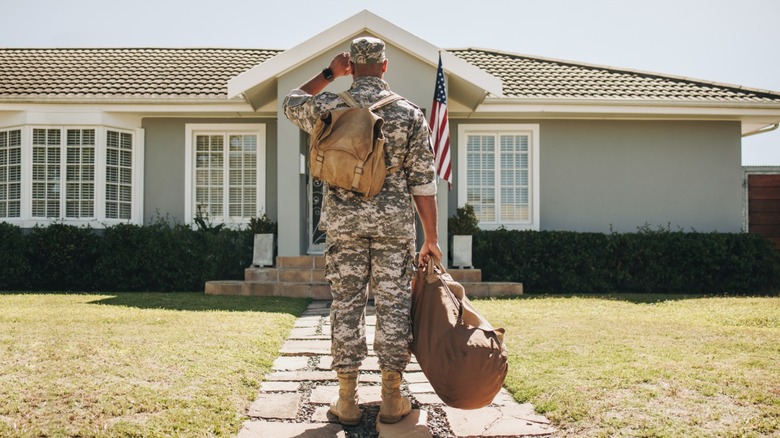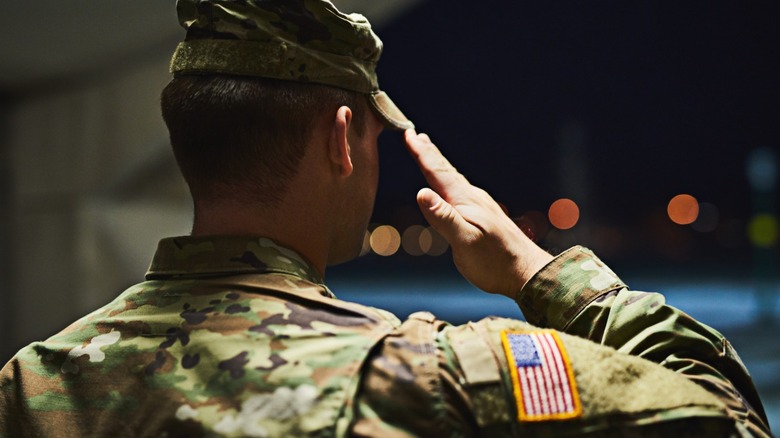10 Common Military Alphabet Code Words And Code Phrases (And What They Mean)
Whether you have buddies in the military or have watched a ton of war movies, you've probably heard several phrases that you didn't understand off the bat. There is a shorthand often used by the military for brevity and clarity, similar to the reason it uses the 24-hour military time. That way, words and phrases spoken into radios are either shortened to reduce transmission time or broken down into the NATO Phonetic Alphabet to ensure clarity or secrecy.
These phrases are often picked up by the troops, and they make their way into the vernacular and sometimes pop culture too. It's also become a way for service members and veterans to spot each other in public, especially as only veterans typically use these terms in civilian life. While you shouldn't impersonate a service member (committing stolen valor and pretending you served), it might be nice to understand the people in your life who were in the military. So, let's look at some of the most common military phrases and what they mean. We also included a few other common codes used in parlance by service members and veterans to help better understand what they say.
MOS
The military isn't just composed of soldiers. Each military branch calls its members different names. And within each branch, there are myriad occupations with their own titles. You might be surprised to find that unique positions exist aboard a U.S. Navy carrier, like a clergyman or barista. But whenever an active-duty service member or veteran asks you what you do in the military, they're typically asking about your "MOS," or Military Occupation Specialty.
This is the military's term for your job, but what makes it stand out from civilian positions is that it's standardized across each branch of the military — whether it's the Army, Air Force, Navy, Marines, Space Force, or the Coast Guard. You will take the Armed Services Vocational Aptitude Battery (ASVAB) to get into the service and pass a medical exam. Then you will do initial training. Once you complete these, you will attend specialized MOS school.
November Golf
It's just a reality that not everything will go your way, nor will you get everything that you want. The military has a unique way of saying that with "November Golf." This means "No Go" and can quickly convey that something is not good, has failed, or didn't pass muster. For example, the worst military equipment of World War II was November Golf for field deployment and didn't perform as expected, making it a massive waste of resources.
There are several other military terms for failure, like SNAFU, which has two variants, with the more polite one meaning "situation normal, all fouled up", and others that are a bit more colorful than that, like FUBAR or Charlie Foxtrot, which we won't spell out but represent other ways of saying that something is massively disorganized. These terms are ways that military personnel can express displeasure and frustration while remaining professional and discreet.
Lima Charlie
Radio communication is crucial to the military, as it allows them coordinate their movements and receive orders. However, radio reception can get choppy, especially over long distances or if there is interference and you don't have one of the best long-range radios in your kit. In times like this, the sender might want to confirm if the receiver can hear them. If their signal is strong, the receiving party will then answer with "Lima Charlie", meaning they can hear the broadcast "loud and clear." But if the signal is bad, they can transmit "say again" to tell the sender to repeat their message.
This can also be used in civilian settings, especially when someone is getting reminded (or nagged) about something. For example, if a veteran is being nagged by his wife to take the trash out for the third time that day, they can answer Lima Charlie with a hint of exasperation, noting that they received the instruction loud and clear the first time around.
Roger and Wilco
Roger is a common term used in military radiotelephony, and you'll frequently hear it being used by pilots in both military and civilian circles as one of the common phrases they use. You might think that "Roger" means "yes", especially as it's often the answer after receiving information. However, it actually stands for "received", with the recipient saying they "received and understood the last transmission." However, that does not require them to do anything about it. The term "Roger" stemmed from the old phonetic alphabet that used it to stand for the letter "R". Even though it has since been replaced by Romeo in the modern NATO Phonetic Alphabet, Roger stuck around in both military and aviation uses.
On the other hand, you use the term "Wilco" if you're given a set of instructions you need to follow. This means "will comply", telling the person on the radio that you will execute the directions given to you. Using this instead of Roger is an important differentiation, as it gives clarity about your intentions and will assure the sender that their command will be carried out.
Charlie Mike
Charlie Mike may sound as simple as two classic names. And in the military it simply means "continue the mission," but it has a lot more meaning baked into it. It's used for operations that face setbacks, encouraging troops to carry on and achieve mission objectives despite mounting challenges. However, it's also the military code word for resilience in the face of growing adversity, such that service members are expected to grit their teeth and stay stalwart in the face of hardships. It could help in overcoming injuries or tech failures so that they can continue showing up to the fight.
The term has also become an encouragement to military personnel who have come home and are carrying the burden of war with them. Support organizations like Hero's Bridge and Charlie Mike use it to remind combat veterans that they have the strength to carry on when they come home.
Oscar Mike
Many military operations are on-the-go. Some units race to reach their objectives and need to coordinate with other operators in the area. So, when they are changing positions, they will use the military alphabet code "Oscar Mike" on the radio. This stands for "on the move" and acts as a means to signal to other units on the channel of your movement. That way, they have situational awareness.
While "on the move" and "Oscar Mike" both have three syllables, the latter is easier to understand over the radio, helping reduce mistakes and confusion. So, instead of telling someone that they're on their way to a target, they would just say that they're Oscar Mike. This applies to life outside of the military as well — when you hear your veteran friends say that they're on a deuce and a half and are Oscar Mike to your place, that means they're heading towards you in a big truck, and you should expect to see them soon.
Mikes and Klicks
Time and distance are crucial for the success of any operation, especially when you have to coordinate across units coming from separate locations. If someone is asking for an ETA and how far you are, the answer is usually in "Mikes" and "Klicks." Mikes stands for minutes, so when someone says that they're about 30 mikes away, that means they expect to arrive in about half an hour. On the other hand, a Klick means one kilometer, or about 0.62 miles.
You might be surprised to learn that the U.S. military uses the metric measure kilometer instead of miles in some applications, separating them a bit from American civilians. So, if you're calling for an airstrike, you might say that the target is about two Klicks to your east. It's also typically spelled with a K, instead of the C used in the word click (as in click on your mouse), as the K stands for kilometer. However, the latter is sometimes accepted as well.
Fast mover
You sometimes hear in movies that when a military unit is pinned down by fire, they'll ask for support from fast movers. Now, fast movers aren't a quick-reaction force of units to relieve them, despite how it sounds. Instead, fast movers refer to fighter jets, especially because they fly rather quickly. This is especially true for the fastest fighter jets: the F-16 Fighting Falcon, F/A-18 Super Hornet, and F-35 Lightning II, all of which can be used for ground attack missions. The sonic boom that these fast-moving jets generate also helps reinforce their speed to people on the ground.
Note that not all air support aircraft fall under this category. For example, the AC-130 gunship isn't considered a fast mover because of its slower momentum (compared to supersonic fighter jets), although it's a pretty potent ground support weapon in places where there is no threat from enemy fighter jets or anti-aircraft fire.
Echo Tango Sierra and short-timer
While young folks can make a career out of the military, there will come a time when their enlistment runs out, or they' have to retire. That fateful date is called Expiration Term of Service (ETS) or Echo Tango Sierra, and service members who are nearing the end of their tour of duty are sometimes called "short-timers." This is something that service members have to prepare for, especially as they re-enter a civilian world that is completely different from the rigors of life in the military.
Some may think that ETS is just like resigning or retiring from a job, but it's actually far more than that. Aside from adjusting to civilian life and often a second career, ETS can also affect those who want to make a career out of the military. Letting the date pass without reenlisting might mean a break in military service, which could affect your career, including bonuses, eligibility, and promotions, among others.
Bravo Zulu
Last, but not least, Bravo Zulu is the military code for a job well done. This might be confusing, as there is no letter B or Z in "well done", and you might think that Whisky Delta is a more fitting alphabet code. However, Bravo Zulu stems from flag communication used by ships in the U.S. Navy, with Bravo standing for administrative signals, with Zulu standing for "well done". This was introduced in 1949, in the Allied Naval Signal Book (ACP 175 series), which NATO adopted after its founding that year.
Before that, the term used by the Navy was "Tare Victor George". However, Bravo Zulu has since been adopted by the other services, so you'll find it used by both the U.S. Navy and the Coast Guard, as well as by the Army, Air Force, and the Marine Corps. So, if a sailor, soldier, airman, or Marine says Bravo Zulu to you, that means you've just completed a job well done.
